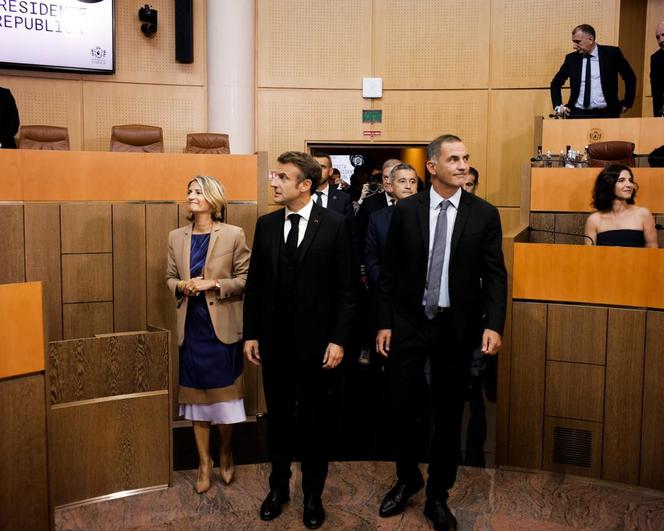


For the first time in history, a French president uttered the word "autonomy" before Corsican elected officials. "We should have the courage to establish a form of autonomy for Corsica within the Republic," said Emmanuel Macron on Thursday, September 28, in Ajaccio, before the 63 representatives of the island's assembly. "It won't be an autonomy against the state, nor an autonomy without the state, but an autonomy for Corsica, and one within the Republic."
In just two sentences, part of a 40-minute speech, the French leader broke an almost 50-year-old taboo. "I'm in favor of taking a new step," he said. "To fully anchor Corsica in the Republic and recognize its uniqueness, we need to move forward and to do that, we need to include Corsica in our Constitution," he said. "It's your wish, I share it, and I make it mine because I respect and recognize Corsica's history, culture, and specificities in the Republic."
The atmosphere was solemn. Former presidents of the Corsican Assembly, Gaullist Camille de Rocca Serra and Communist Dominique Bucchini were seated among the guests, indicating that the hour was, if not serious, important at the very least.
A year and a half after discussions began following the uprising of Corsican youth sparked by the killing of nationalist Yvan Colonna in a mainland prison, Macron is launching the second phase of a slow and painstaking process. He has set a deadline of six months for final arbitration. He warned, however, that any new arrangement between the island and France would require a consensus among Corsica's elected representatives. "The various institutional issues must be agreed by the political groups of the Corsican Assembly," Macron said.

Macron is keen to reach a unanimous agreement with Corisan representatives. Without it, he fears failing in the face of parliamentary resistance in Paris. In other words, he agrees to autonomy but not to the one the Corsican Assembly defined on July 5. Its priorities were recognition of the Corsican people, co-officiality of French and Corsican languages and a resident status enabling insulars to benefit from reserved access to housing and other privileges.
According to a local elected representative, Macron once again resorted to his notorious en même temps (at the same time) approach, applying it to the Corsican situation this time. While taking care not to limit the scope of the discussions, the French president said he favored "recognizing the specific characteristics" of the island – historical, linguistic, and cultural – in a specific article of the French Constitution. Macron also said he encouraged better teaching of the Corsican language, which should "be placed at the heart of the life of every Corsican," but, anxious not to anger the representatives of the right in Corsica and France, he did not go so far as granting the co-officiality cherished by the nationalists. He was also careful not to mention the "Corsican people" or speak of "resident status."
You have 56.18% of this article left to read. The rest is for subscribers only.
